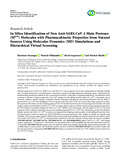Please use this identifier to cite or link to this item:
http://ir-library.mmust.ac.ke:8080/xmlui/handle/123456789/2107Full metadata record
| DC Field | Value | Language |
|---|---|---|
| dc.contributor.author | Onyango, Harrison | - |
| dc.contributor.author | Odhiambo, Patrick | - |
| dc.contributor.author | Angwenyi, David | - |
| dc.contributor.author | Okoth, Patrick | - |
| dc.date.accessioned | 2022-11-04T13:00:59Z | - |
| dc.date.available | 2022-11-04T13:00:59Z | - |
| dc.date.issued | 2022-10-10 | - |
| dc.identifier.uri | https://www.hindawi.com/journals/jtm/2022/3697498/ | - |
| dc.identifier.uri | https://doi.org/10.1155/2022/3697498 | - |
| dc.identifier.uri | http://ir-library.mmust.ac.ke:8080/xmlui/handle/123456789/2107 | - |
| dc.description.abstract | Infectious agents such as SARS-CoV, MERS-CoV, and SARS-CoV-2 have emerged in recent years causing epidemics with high mortality rates. The quick development of novel therapeutic compounds is required in the fight against such pathogenic agents. Unfortunately, the traditional drug development methods are time-consuming and expensive. In this study, computational algorithms were utilized for virtual screening of a library of natural compounds in the ZINC database for their affinity towards SARS-CoV-2 Mpro. Compounds such as cinanserin, nelfinavir, baicalin, baicalein, candesartan cilexetil, chloroquine, dipyridamole, and hydroxychloroquine have the ability to prevent SARS-CoV-2 Mpro from facilitating COVID 19 infection; thus, they treat COVID 19. However, these drugs majorly act to reduce the symptoms of the disease. No anti-viral drug against COVID 19 virus infection has been discovered and approved. Therefore, this study sought to explore natural inhibitors of SARS-CoV-2 Mpro to develop a pharmacophore model for virtual screening of natural compounds in the ZINC database as potential candidates for SARS-CoV-2 Mpro inhibitors and as therapeutic molecules against COVID 19. This study undertook in silico methods to identify the best anti-viral candidates targeting SAR-CoV-2 Mpro from natural sources in the ZINC database. Initially, reported anti-SARS-CoV-2 Mpro molecules were integrated into designing a pharmacophore model utilizing PharmaGist. Later, the pharmacophore model was loaded into ZINCPHARMER and screened against the ZINC database to identify new probable drug candidates. The root means square deviation (RMSD) values of the potential drug candidates informed the selection of some of them, which were docked with SARS-CoV-2 Mpro to comprehend their interactions. From the molecular docking results, the top four candidates (ZINC000254823011, ZINC000072307130, ZINC000013627512, and ZINC000009418994) against SARS-CoV-2 Mpro, with binding energies ranging from –8.2 kcal/mol to –8.6 kcal/mol, were examined for their oral bioavailability and other pharmacokinetic properties. Consequently, ZINC000072307130 emerged as the only orally bioavailable drug candidate with desirable pharmacokinetic properties. This candidate drug was used to perform MD simulations, and the outcomes revealed that ZINC000072307130 formed a stable complex with the viral main protease. Consequently, ZINC000072307130 emerges as a potential anti-SARS-CoV-2 Mpro inhibitor for the production of new COVID 19 drugs. | en_US |
| dc.language.iso | en | en_US |
| dc.publisher | HINDAWI | en_US |
| dc.title | In Silico Identification of New Anti-SARS-CoV-2 Main Protease (Mpro) Molecules with Pharmacokinetic Properties from Natural Sources Using Molecular Dynamics (MD) Simulations and Hierarchical Virtual Screening | en_US |
| dc.type | Article | en_US |
| Appears in Collections: | Gold Collection | |
Files in This Item:
| File | Description | Size | Format | |
|---|---|---|---|---|
| 3697498.pdf | 4.77 MB | Adobe PDF |  View/Open |
Items in DSpace are protected by copyright, with all rights reserved, unless otherwise indicated.
